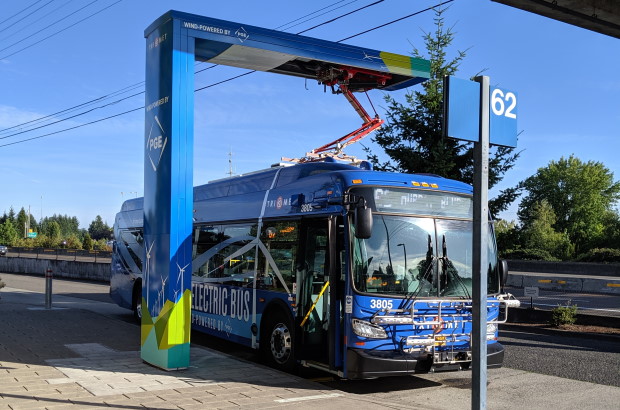We've been searching for bright spots after watching the COP25 international climate talks fail earlier this week – with the U.S. federal government largely to blame. This is another setback as climate urgency grows and reminds us that we must double down on climate action right here in Oregon. And that’s why we are grateful the City of Portland and TriMet both took some big strides to accelerate toward 100% clean and carbon-free operations!
TriMet’s fleet of 600+ transit buses makes them the largest consumer of diesel in Oregon. That is why we celebrated last year when they announced that they would transition to a non-diesel bus fleet by 2040, starting with a pilot of 80 electric buses. Now TriMet has committed to stop purchasing diesel-powered buses entirely by 2025 and instead buy renewable-powered electric buses. This is a critical transition to reduce air and climate pollution that can’t happen soon enough. We will continue pushing TriMet to stop buying diesel buses even sooner than their current planned date of 2025. Stay tuned!
Even as they electrify, TriMet will still have hundreds of legacy diesel buses on our roads for at least another decade. That is why we are also thrilled that TriMet has committed to start using renewable diesel instead of petroleum-based diesel fuel by April 2020. Renewable diesel (R99) is a cleaner drop-in fuel derived from recycled fats and oils (and palm oil is prohibited). This move should reduce their fleet’s greenhouse gas footprint by at least 50% as they start flipping their fleet to electric!
A few other critical commitments that TriMet made include:
- using 100% wind power to operate MAX Light Rail by February 2020;
- prioritizing funding for youth bus passes across the region (kudos to OPAL Environmental Justice and other community groups for leading this effort!)
- electrifying their non-passenger support vehicles
- applying a “carbon lens” to all future projects
The City of Portland is also committing to “walk the talk” on climate action by cleaning up their own operations. A big part of that is adopting an EV-first policy for the city-owned vehicle fleet. The City has already committed to be powered by 100% clean electricity by 2035 so electrification of its fleet is the cleanest way forward. The City of Portland also renewed its ban on new fossil fuel infrastructure, a critical protection.
In addition, the City has committed to:
- adopt an internal price on carbon;
- budget for carbon reduction across bureaus;
- increase energy efficiency for City buildings; and
- successfully implement the Portland Clean Energy Fund.
We need action at all levels of government, across our businesses and communities – and we’re glad to see City of Portland and TriMet continue to find ways to reduce their carbon footprints. Let’s ride this momentum to secure meaningful statewide climate action in Oregon in 2020 – as well as encouraging other transit agencies and cities to step up.





